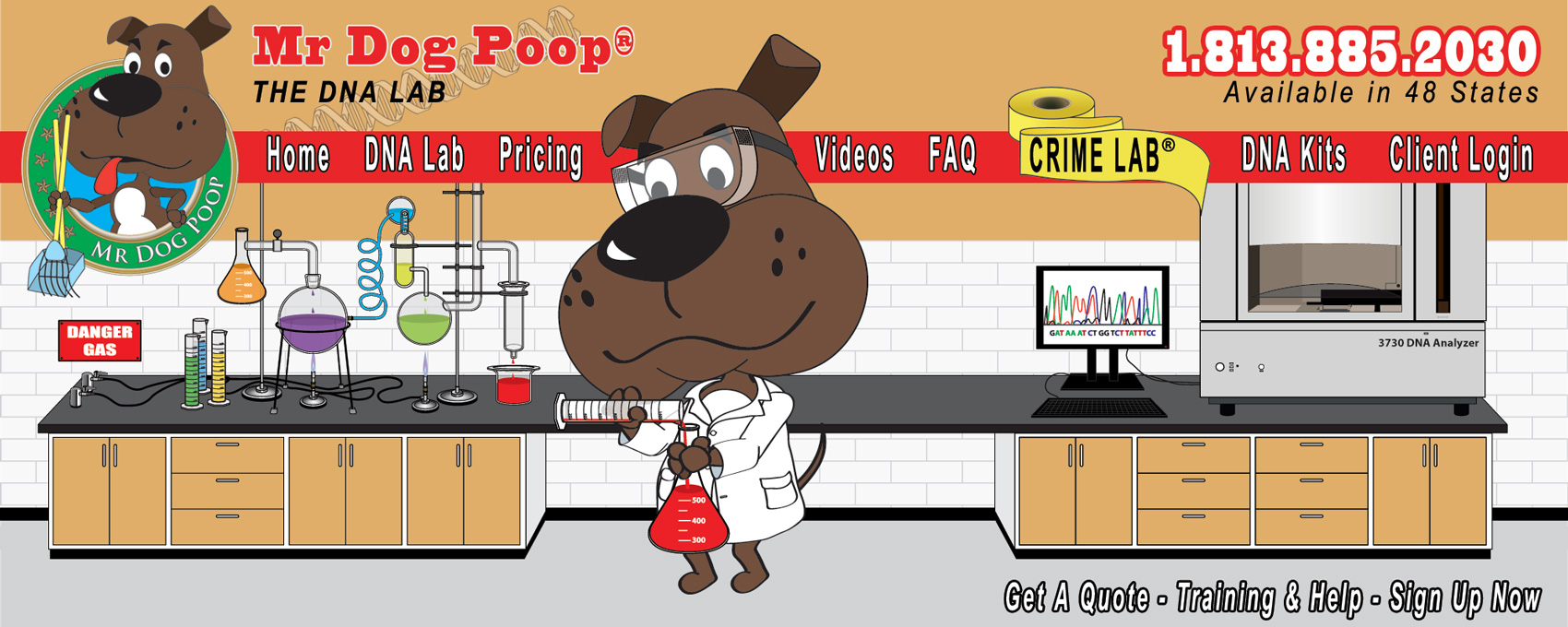Dog Poop DNA Accuracy - Is dog poop DNA testing accurate?
With more and more multifamily communities now testing dogs for dog poop DNA matching to eliminate dog poop left on properties, the question being asked is "How accurate are the results?". One of our competitors claims that they are 99.9% accurate, however, while that is a great marketing ploy, it is just not how DNA works. DNA matches are based on probability, not accuracy, more specifically "Random Match Probability". This is the likelihood that another dog could possibly match the same genetic fingerprint as the poop sample. That number is based on the number of matching markers and the allelic frequency of the alleles present in those markers based on a significant sampling of the entire dog population. For example, if we use the "sex" marker and determine that the dog that left a poop sample is a "Male" and we assume the population is made up of 50% male and 50% female then we know the possibility that another dog will match that sample is 1 in every 2 dogs or about 50%. Does that mean the test is accurate? No, it means we know that the sample could belong to half of the dogs in the country or about 50 million suspects. Now, lets say we have a second marker with 4 possible matches and each are present in 25% of the dogs in the population. Now that gives us a 1/4 probability of another dog matching of the 1/2 or a 1 in 8 random match probability. Meaning that this poop sample could belong to about 12.5% of the dogs in the population. Now we have narrowed down the results to about 12.5 million suspects. Of course, when we are working with more markers and more variants, the numbers can become astronomical and the possibility that another dog will match can be in the billions, trillions to one that another dog might match the same sample. In those cases, we can easily narrow the suspect pool to just one guilty dog. That is not to say that another dog cannot match the same profile, but based on the frequencies that the markers sizes occur the chance that that would happen would be trillions to one and the likelihood that there are 2 dogs living in the same vicinity make it almost impossible for any 2 dogs to match the same profile. So the more marker matches we have, the more likely the the accused dog is responsible for leaving the sample. At Mr Dog Poop, we require that at least 6 markers are full matches before considering if that a dog's owner is guilty of leaving the dog poop at the crime scene. We then evaluate the probability that that dog was responsible by looking at that random match probability. Lets look at the Marker Panel Labeled MDP19 which has a size range from 87 to 101 or 14 unique size variants. Based on a sampling of around 50,000 dogs listed below are the numbers of dogs where each alleleic size was present.
If our sample and dog have an Alleleic size of "87" then out of 50,000 dogs only 7 or 0.014% of the population would match. However, if the size is "91" then 12,468 dogs could match that sample out of every 50,000 or about 25% of the population Mr Dog Poops matching process uses this type of data across all 23 markers to make a determination as to the likelihood that any other dog could match the sample. Even with 6 matching markers, depending on how many other dogs share the same characteristics we may not be confident that more dogs could not have been responsible for depositing the poop. Conversely, if we have just a few markers and they are extremely rare, then we can make the determination based on less markers and still maintain an extremely high random match probability. Breed Matches There is a common misconception that DNA is being used to look for the breed of the dog and that someone cannot be accused if there is more than one dog on the property of the same breed, because either dog could be responsible. This is not the case at all and in fact, we have no idea what the dogs breed might be. This process pinpoints the exact dog even when they were from the same litter, look the same and have the same mother and father. In these cases, each dog inherits one allele from the mother and one from the father out of a possibility of two markers giving each marker 4 possible varients within the same family. So the possibility that a sibling matches even just 6 markers is 1 in 4096. Determining Matches Ultimately this is not a binary decision, the data must be analyzed and a decision must be made as to whether a dog is a match or there is too much uncertainty and the match cannot be conclusive. One of the factors in our favor is that the populations at each property are relatively small. So we are normally only matching dogs against a population of less than 100 dogs. At the same time, we need to evaluate if another dog may have entered the property who is not in the registered population and could be responsible for the poop event. We have to assume a community of 800 apartments that houses 100 dogs could have any number of dogs potentially visiting any of the 800 apartments on the property. This greatly opens our pool of suspects and is the reason we must have a very high random match probability to determine a conclusive match. DNA Quality Of course, just like older forensic methods like standard fingerprints, the data is dependant on quality samples. Since Mr Dog Poop employees are not collecting the DNA, we depend heavily on each person to correctly and effectively collect good DNA samples for us. We can only work with what arrives at our lab. So it is critical that the field collectors work with our team to fully understand which samples to collect, when not to collect samples and where on each sample they will find the highest concentration of DNA. In many cases, field collectors have not read the instructions, watched any training videos and often collect the wrong parts of the dog poop which will yield no results. Of course, poorly collected samples will never result in false positives, they will simply fail to produce any markers which can be used to identify the suspect. Cross Contamination One of the dangers of having untrained people collecting poop is the risk of cross contamination. In limited cases, we have seen samples where the same collection tools were used to collect all the samples on the same day, meaning each subsequent sample would have a combination of DNA from the previous samples. In most cases, this would be easy to detect, because more that 2 alleles would be present in each marker, but in some cases, it can create a seemingly uncontaminated sample that wont match anyone because it is a hybrid of multiple dogs. Mr Dog Poop's collection kits provide gloves and collection sticks for each collection and should never be reused. While it is always easier to leave on the same gloves when collecting multiple samples, it can result in unsatisfactory results. Conclusion: The Accuracy of Dog Poop DNA Testing Answering the question of "How accurate is dog poop DNA testing?" is not as easy as just saying it is 99.9% accurate. There are many factors in making a determination and based on all those factors we typically see results in the hundreds of trillions to one that any 2 dogs might be guilty of depositing the poop sample on a property. DNA testing is responsible for sending thousands of humans to prison and the legal system sees it as a formidable factor in deciding if someone is guilty. It is certainly a viable option to pick a single dog out of a small population with near 100% certainty and well tested in the field by thousands of communities. |




